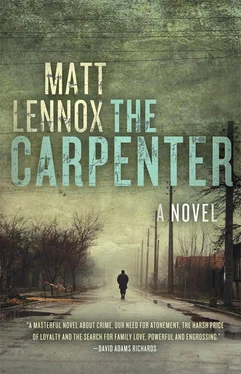Matt Lennox - The Carpenter
Здесь есть возможность читать онлайн «Matt Lennox - The Carpenter» весь текст электронной книги совершенно бесплатно (целиком полную версию без сокращений). В некоторых случаях можно слушать аудио, скачать через торрент в формате fb2 и присутствует краткое содержание. Жанр: Криминальный детектив, на английском языке. Описание произведения, (предисловие) а так же отзывы посетителей доступны на портале библиотеки ЛибКат.
- Название:The Carpenter
- Автор:
- Жанр:
- Год:неизвестен
- ISBN:нет данных
- Рейтинг книги:5 / 5. Голосов: 1
-
Избранное:Добавить в избранное
- Отзывы:
-
Ваша оценка:
- 100
- 1
- 2
- 3
- 4
- 5
The Carpenter: краткое содержание, описание и аннотация
Предлагаем к чтению аннотацию, описание, краткое содержание или предисловие (зависит от того, что написал сам автор книги «The Carpenter»). Если вы не нашли необходимую информацию о книге — напишите в комментариях, мы постараемся отыскать её.
The Carpenter — читать онлайн бесплатно полную книгу (весь текст) целиком
Ниже представлен текст книги, разбитый по страницам. Система сохранения места последней прочитанной страницы, позволяет с удобством читать онлайн бесплатно книгу «The Carpenter», без необходимости каждый раз заново искать на чём Вы остановились. Поставьте закладку, и сможете в любой момент перейти на страницу, на которой закончили чтение.
Интервал:
Закладка:
— Some, she said. I know some of it. But this is different. Hearing it from you.
— Well, Darien shot this policeman and he and Remi walked right out the door. Pretty quick it was two boys who were in a hell of a lot more trouble than they’d thought of. It wasn’t much more than a day or so before a half-dozen Provincial cops were up here from the city. They took over from us town cops. They hired on a bunch of local boys-men I knew, friends of mine-to help them track down Darien and Remi. There was one thing that the inspector figured out. Charlie Rayfield had a little.22 pistol he wore on his ankle and he’d fired a few shots off. The Provincial inspector, he figured maybe Remi or Darien had gotten shot on the way out, and if that was the case, maybe they didn’t get so far as everybody thought.
— My dad used to say it was you.
— I know what your dad would of said. Thing was, I knew your uncles pretty well. I didn’t want it to end in more shooting, and I figured with the Provincials looking for them, that’s what would happen. So I went over to an old bootlegger’s place I knew of, where your uncles used to like to go to have a drink. And sure enough, that’s where they were. The inspector was right, Remi was shot. He was in bad shape, Ellie. He had a.22 bullet in his stomach.
— What did you do?
— What I did was I talked them into turning themselves over to me. They were scared. Remi was sick. But while this was happening, Charlie Rayfield died in the hospital. So the charge became murder. The way it turned out …
— Please. I want to hear it.
— Your uncle Remi died from blood poisoning. Darien got charged with murder. The murder of a policeman was a serious thing. He went to the penitentiary for a few years. Then in 1944, when your dad was serving in France, they brought Darien back here to town. Right back home. And just out there, where the yard used to be, that’s where they did it.
— Where they executed him.
— Yes. He was the last person in the county to be put to death. I spoke to him, your uncle, the night before. He was scared, but not so scared as he could of been. Mostly he wished his ma would of come to see him. But things were different for her. She didn’t have the farm any more. I was there the next day when Darien was hanged. And I was a cop for another almost thirty years after that but there’s not a day that goes by that I don’t think of that morning. Of your uncle up there on the platform. Every day, Ellie.
She was quiet for awhile.
— I don’t know what to say, Stan. I knew some of this but I didn’t know it. I guess I think for all my dad was or wasn’t, how could he have two brothers who ended up like that?
Outside the window where the vehicle compound and the wall used to be, they’d landscaped a couple of footpaths overlooking the river. A man in coveralls came into view, raking leaves under a red maple. There were some odd characters who hung around the library in the afternoon. A man in a plaid jacket was snoring quietly in a study carrel. A man with mole eyes behind mended glasses was sitting at a table close by, bent over an anatomical textbook, looking at images of the female reproductive organs.
— It was all a long time ago, said Stan.
They stayed at the library for awhile and Eleanor held her end of their agreement. She moved into the telling as if it were something that lifted a burden from her. That she and her sister were twins did not give her any great insight.
— You can know someone better than anybody else knows her, and still you don’t know her at all. How is it that everything went bad for her, but not me?
Nobody gave Judy’s ailment a name for many years. Troubles with their father, Aurel, were enough. What had no name warranted no sympathy. It wasn’t when their father died but when Eleanor went to college in the city that Judy suffered the most. Telling this to Stan, Eleanor had to pause between her words and look away. She said she felt guilty about that.
A doctor paid a visit and made a referral. The psychiatrist to whom Judy was referred gave her condition a name.
While Eleanor went to college, Judy went to a hospital east of the city, where she lived in a residence with some other girls. They were ex-junkies, they were girls with scars in their arms, they didn’t eat right, they didn’t say the right things. But Judy herself got along at the hospital after her first few months. There was a farm on the grounds. There was a new gymnasium. There were things to do with your hands and with your time.
Eleanor visited when she could. She was going to college and she was not far away. Some of these girls at the hospital were suicidal. They slugged through their time under a constant state of scrutiny.
— But Judy, said Eleanor, bad as she might get, she wasn’t ever, like, she wasn’t the kind to kill herself. That wasn’t part of it. So that’s why, Stan, that’s why …
Judy was admitted to hospital again after their mother died. Eleanor, back home between terms, started going with Tommy Spencer. He was a local boy, his dad did roadwork contracting. Then the doctors at the hospital started releasing a lot of the patients to reintegrate them with the community. Judy was discharged two years ago, the same time Eleanor started at the National Trust. Judy and Eleanor moved together into their parents’ old house, the house they’d grown up in. Eleanor’s benefits covered a prescription for amitriptyline.
The pill was called Elavil and it kept Judy level. She put on some weight, but not much, and before that she was really too skinny anyway. She slept a lot. But for once she was even-tempered.
Still, Eleanor considered that Judy might grow bored. One thing about the hospital was that they kept you occupied. So Eleanor talked to Alda Shipley at Busy Beaver Janitorial, who’d had the cleaning contract at the National Trust for a long time, and for the first time in her life, Judy had a job. Busy Beaver was a bonded local outfit. They’d arrive in the afternoon before the branch closed and they’d clean until eight o’clock at night. The bathrooms, the carpets, the wastebaskets. Alda reported back to Eleanor that Judy didn’t have much to say but she usually smiled faintly and she worked steadily and didn’t object to any of the tasks.
Then Eleanor told Stan about the man who’d come into Judy’s life. Around May or June, Judy started getting agitated. She was quick to put you off if you asked her anything. She would say, I’m fine, why do you want to know? It wasn’t any kind of agitation Eleanor had seen in her before. Eleanor was already guessing what it might be.
And why not? Judy wasn’t unattractive, and since the medication had taken the swings out of her mood, she was good company. She wasn’t forthright about whoever the man might be and Ellie didn’t press her, but then she happened to meet him at the bank one day in the summer. The Busy Beaver crew had started their work in the late afternoon. Eleanor had a dentist’s appointment and was given leave fifteen minutes early. She went down the rear corridor and said goodbye to her sister and went out through the back door. She was halfway across the parking lot behind the bank when a man got out of a car and said: Hey, Judy.
This man was kind of singing an old song, It’s Judy’s turn to cry, it’s Judy’s turn to cry. Judy’s smile was so mean , sang the man.
Eleanor guessed it took her coming closer, twenty feet or so, for the man to realize she wasn’t her sister. They looked enough alike until you got up close.
— You’ve got to be Ellie, said the man. I’m sorry to have mixed you up.
Eleanor said it was okay, it happened from time to time. She let on that she knew about this man in Judy’s life, that he wasn’t something she’d only guessed at. So that was probably why he didn’t tell her his name. Eleanor couldn’t exactly say what he looked like. He wore jeans and a T-shirt, she remembered. Good for the weather but not like he’d come from an office or anything. He had sunglasses on, the kind with mirrored lenses. The car he was leaning up against wasn’t anything special. He was older than Judy, maybe even ten years older, but otherwise he just looked like anybody.
Читать дальшеИнтервал:
Закладка:
Похожие книги на «The Carpenter»
Представляем Вашему вниманию похожие книги на «The Carpenter» списком для выбора. Мы отобрали схожую по названию и смыслу литературу в надежде предоставить читателям больше вариантов отыскать новые, интересные, ещё непрочитанные произведения.
Обсуждение, отзывы о книге «The Carpenter» и просто собственные мнения читателей. Оставьте ваши комментарии, напишите, что Вы думаете о произведении, его смысле или главных героях. Укажите что конкретно понравилось, а что нет, и почему Вы так считаете.












